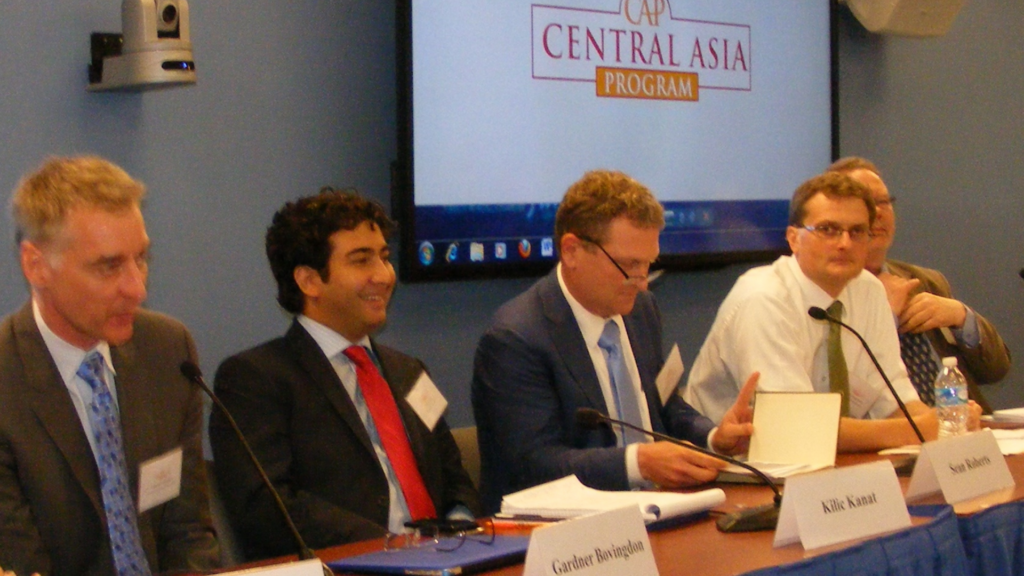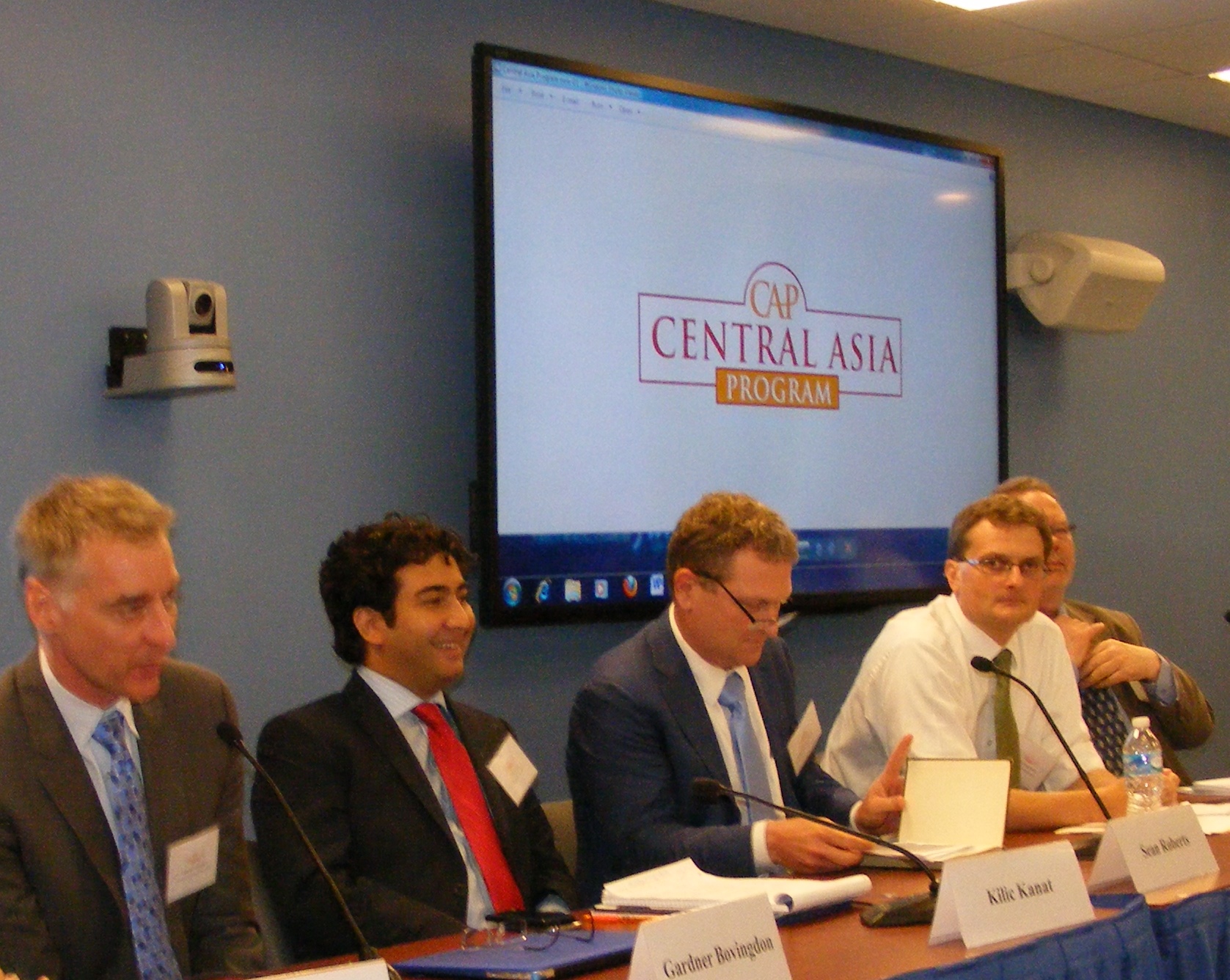Human Rights in Focus at Uyghur Studies Conference

October 7, 2014
Greg Fay, Manager, Uyghur Human Rights Project
Last month, the George Washington University assembled dozens of experts on the study of East Turkestan from around the world in the “First International Conference on Uyghur Studies, History, Culture, and Society. The conference addressed a range of historical, cultural, social and political issues and there was a major focus on human rights.

Speakers in the first session from left to right: Gardner Bovingdon, Kilic Kanat, Sean Roberts, Henryk Szadziewski and Michael Dillon
The life sentencing of Ilham Tohti two days prior to the conference was a specter over the event and permeated many of its proceedings. Not only is Ilham Tohti a respected peer of the academics at the table, but his work also espouses the conference’s purpose to promote and enable dialogue relating to the Uyghur people. China’s harsh sentencing of Professor Tohti signals its growing intolerance for peaceful dialogue.
In response, participants such as James Millward and Kilic Kanat spoke out to the public through Op Eds; others made statements through their academic institutions like Gardner Bovingdon at Indiana University; and still others like conference organizer Sean Roberts were quoted in coverage of the sentencing. Their admiration and despair were reflected in repeated testimony about the tragedy of his life sentence.
Below are excerpts from the first panel of the conference, entitled “The Policy Debate.” The speakers were asked to discuss the roots of unrest in East Turkestan, and their responses encompass the broader implications of Professor Tohti’s sentencing as well as the importance of dialogue to reducing tension in the region. The 5 speakers include UHRP Senior Researcher Henryk Szadziewski, Professor Gardner Bovingdon of Indiana University, Professor Kilic Kanat of Penn State Univesity, Professor Sean Roberts of George Washington University, and independent scholar Michael Dillon. Listen to their responses on Soundcloud, and find transcripts below.
Garden Bovingdon
If you looked at the images of Ilham Tohti in the press in the last few weeks, you undoubtedly saw a picture of him with a camera behind him in his classroom. And if you looked at some of the footage from his trial you will know that there were images from his classroom used against him as well as students who probably under torture were forced to testify against him. It is an abomination and I’m afraid it is both a metaphor for and a future of Chinese rule in Xinjiang, that this brilliant man, who worked so hard to speak the truth was surveilled in his own classroom and images of him speaking were used in the classroom. But when you look at that picture of him with the camera behind him you realize that camera is not the camera used against him. That camera was used against his students. That camera is watching you. In this room, this camera is a sign of international exchange, the importance of conferences like this, where people come together from all over the world to speak freely. This enables people across wide distances, people who cannot come to this room to share their thoughts. This camera is a sign of the good things that a video system hooked up to the Internet can do. A camera which merely watches and does not tell you why it’s watching until years later it’s deployed against you, that’s a different kind of camera altogether. And I think it’s a metaphor for Chinese policy because the message to Uyghurs from every camera, in every classroom, on every street corner, in every mosque is, “We don’t trust you. We’re watching you, and we don’t trust you.” And I think it’s hard to come up with a more eloquent message about the general tenor of Chinese policies.
Kilic Kanat
One significant dimension of ethnic conflict is ethnic conflict has two sides, and in order to resolve an ethnic conflict you need a healthy meaningful communication between two groups. And if you are considering groups in the diaspora like World Uyghur Congress as separatist, if you are recognizing more conservative groups as fundamentalists, and if you are recognizing more moderate voices within the country itself as separatist itself and put them in prison, that means you don’t have a counterpart to talk about this problem. And without this meaningful conversation probably you will not be able to solve the problem. And more, in order to be more, I don’t want to be more pessimist here, but it also shows that there is no intention to resolve this problem itself.
Sean Roberts
In a lot of ways, the Chinese government could resolve a lot of their problems in Xinjiang by taking a very different approach to development. The approach being taken right now is very top down. It’s focused on building infrastructure and building industries that will only bring in more Han Chinese migrants which are obviously exacerbating tensions between Han Chinese and Uyghurs, and there’s no real engagement with local communities about what kind of development that the local communities want to see, so it’s also displacing people from their home regions and their actual houses, it’s taking up agricultural land that has been in Uyghur families for generations, and I think that without engaging the Uyghur population about a future vision for Xinjiang that it’s likely the Chinese government is going to continue to encounter a lot of problems with the Uyghur population in the region.
Henryk Szadziewski
This unrest has happened against a backdrop of diminishing or restrictions on Uyghur expression and agency, and also curbs on key markers of their identity or their distinctiveness such as language and religion. And I feel like grievances, what I read, are building around state interpretations of so-called illegal religious activities, also policies such as bilingual education, and endemic social and economic discrimination, all of these striking at the heart of Uyghur livelihoods and identity. I feel like, as Sean rightfully said, these policies are top down and there are very few effective measures to tackle this endemic discrimination that Uyghurs face, capped with a squeeze on peaceful dissent, and tension is going to build. It’s very important for Uyghurs in an era of rapid change where there’s an infrastructure overhaul, Han migration and also urban transformation, that Uyghurs have a voice in all of this change.
Michael Dillon
There’s one image that stuck in my mind which I don’t have a photograph of, is being in the bazaar in Kashgar surrounded as usual by lots of relatively poor, not particularly well dressed Uyghurs and coming into the bazaar, lording over the whole thing, 3 uniformed officers of the People’s Armed Police. Very young people, 1 man, 2 women, just showing their authority and how powerful and important they were. And it’s this very clear, visible difference between the way the Chinese behave and the way the Uyghurs are, and the attitude towards the Uyghurs. And all the points that have been made about the marginalization of the Uyghurs, the discrimination, and the relative poverty, all of these things are the background to the recent violence.
